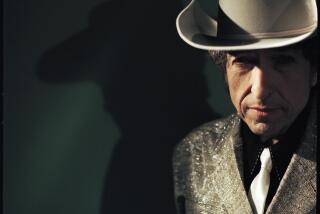Playing for the Moment
- Share via
After conquering the pop-music world in 1996 and ’97 with his album “Odelay,” Beck is lowering the bar with his new collection. Neither the official follow-up nor one of his experimental detours, “Mutations” (in stores Tuesday) is a simpler production, but the reflective songs and spontaneous performance capture a new side of the artist (see accompanying review, Page 72).
In an interview, Beck explains the low-profile strategy and offers a glimpse at “Odelay’s” real successor, which he’s recording for release next year.
Question: This album is out pretty quickly after your tour. How did it come about?
Answer: These were all songs I had written on my own over the last four years, a little longer. . . . It was just a matter of a group of songs gravitating to each other. . . .
When I finally got off tour, I scared up a studio and found somebody to record. I didn’t know it would be an album. I didn’t know what it would be. I thought, maybe go in and do a bunch of demos. That would have been fine. There was no pressure to come up with anything. If these songs didn’t fly, then I’d go and write some new ones or try something else. Maybe get an orchestra and do an orchestra record or go to Nashville and do a record there. I had a lot of different ideas on the back burner.
Q: This was the first time you recorded live with your band. Why did you want to try that?
A: It was just a gut instinct. . . . I’m not a purist with traditional studio techniques and analog and all that. I recognize the benefits of digital. But there’s something about a commitment to laying something on a tape that can’t be altered later. It’s a moment, and you have to express everything you want in that moment.
Q: Geffen Records is presenting “Mutations” as an interim album, not really the follow-up to “Odelay,” and it was originally made for a small, independent label. Why that approach?
A: You know, it’s just trying to reconcile the way the business works these days and the creative urge. The way it’s structured now, you really only are allowed to put out an album every two or three years, which is stifling for a musician. That allows no room for mistakes or explorations or anything. You’ve got to say your piece and then shut up for a couple of years. But in three years, a lot of different things happen. You get a lot more ideas.
This record was intended to kind of show up, like an uninvited guest. . . . People could try to find their way to it. It wasn’t that I was trying to downplay it or felt that it was insubstantial in any way. I’m just trying to come out with a body of work without overwhelming people.
Q: How about the “real” follow-up that you’ve been recording?
A: I don’t really know how to describe it. . . . It is completely different from “Mutations.” Exploring some other areas. . . . I think it’s stuff that I wanted to do on “Odelay” but I wasn’t ready, but I’m kind of in the right place for it now. Stuff that might be more electronically primitive.
You know, I’m just wary of this whole millennial overload. I feel with the millennium, people are coming out with their statement and their summation and trying to extract something meaningful and poignant with this whole culmination of the century and the millennium and all that. And I feel that I just want to come out with something kind of stupid. . . . It’s not really a time to be precious. It’s a time to celebrate and embrace the broadest human energy and just ride it.
More to Read
The biggest entertainment stories
Get our big stories about Hollywood, film, television, music, arts, culture and more right in your inbox as soon as they publish.
You may occasionally receive promotional content from the Los Angeles Times.










